
Course Objective
The objective of this course on ECE is to enable the participants to build a good understanding of how children develop and learn through dual mode workshops by knowledgeable resource persons, hand-outs of relevant material, and an opportunity to visit a program where appropriate ECE practices can be seen and discussed with experienced practitioners, followed by mentoring and sharing.Course Outcomes
A course for capacity building of ECE teachers and organizations that offers the knowledge, skills, perspective, mindset and practices, so that the participants would be able to:- Understand how young children develop and learn;
- Create environments in which children thrive;
- Develop respectful family and community relationships;
- Responsible and effective assessment through observation and documentation;
- Teach to promote learning, using varied and effective practices, and knowledge content;
- Become an advocate for children and their rights.
Pre-requisites
Coordinators, supervisors, project officers, project associates and field staff of government (ICDS) and non-government organizations working in ECE. The participants should know Hindi (knowledge of Marathi will be an advantage). They should have some experience of working with small children. They should preferably have completed their graduation. However, for the field staff, HSC should be fine. Participation of one field-level person and one from the supervisory cadre from each organization is preferable.Expected Commitment
- Contact sessions (workshops in Pune and field visit at Phaltan) over eight (8) days
- On-line workshops and meetings - 6 hours
- Tasks - 5 hours
Course Details:
The course will have five modules:- How children develop and learn;
- Social emotional development;
- Language and communication;
- Integrated learning through play, and;
- Teaching practices.
| Phases | Module | Activity/No of hours | Mode of Delivery | Location |
|---|---|---|---|---|
| Phase 1 | Four-days residential workshop | Face to Face | Pune | |
| Phase 2 | Face to Face | |||
| Phase 3 | Four-days residential workshop | |
Face to Face | Pune |
About The Resource Organization
Pragat Shikshan Sanstha (PSS) is a unique educational enterprise, combining an intensive effort to develop individual children and an attempt to reach out to children, teachers and parents in government schools, as well as encouraging research and innovation. It is an ongoing intellectual endeavour, attempting to implement the best in educational thought and practice, and to carry on a dialogue with researchers, government officials and the general public. PSS firmly believes in disseminating its innovative practices and in reaching out to various stakeholders in the education system and the community at large. It has been actively involved in promoting early literacy in Municipal and Zilla Parishad schools through the Reading Writing Improvement Programs managed by its Educational Outreach Unit. It has also been carrying out several programs since 1994, reaching thousands of children from government schools in Maharashtra. Apart from running its own educational programs, PSS is a resource organization offering courses, capacity building workshops and resources in the form of films, posters, videos and books.Wesbite: https://pssphaltan.org/
Course Facilitator
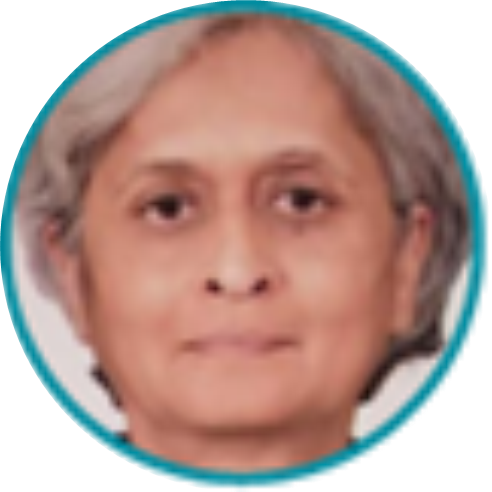
|
Neelima Gokhale has a B.Ed. (Hon) ECE and a Ph.D. in ECE from University of South Australia. She has been a kindergarten teacher for 10 years in Hong Kong and an ECE teacher, principal, teacher trainer and curriculum developer in Singapore for 13 years. She headed the team at PSS to develop the ‘Pragat Early Childhood Educators’ Course for Rural India’ in 2007, as HoD of Early Childhood Education at PSS. She has also been responsible for setting up, mentoring and monitoring a lively ECE program at PSS from 2009 to 2012. She has carried out an impact study for CmF (Centre for Microfinance) Rajasthan, as a part of the Nurturing Early Literacy project. |
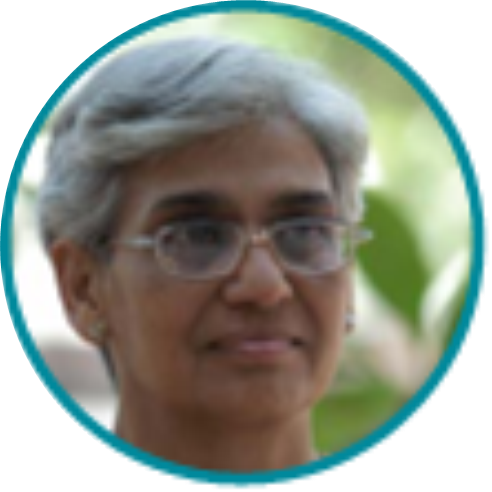
|
Manjiri Nimbkar is a medical doctor. After 10 years of medical practice, she became a teacher at Pragat Shikshan Sanstha’s Kamala Nimbkar Balbhavan in Phaltan, Maharashtra. She has also worked as the headmaster of the primary section, and treasurer, secretary and director of PSS. She did her MA in Elementary Education, winning the gold medal. Along with her team, she developed ‘Pragat Curriculum for Early Childhood Educators in Rural India’, supported by seven (7) booklets, 16 films and 44 posters. In her capacity as an ECE technical partner for Centre for Microfinance, Rajasthan, she has provided inputs for setting up model AWCs in the state’s Pindwada block. |
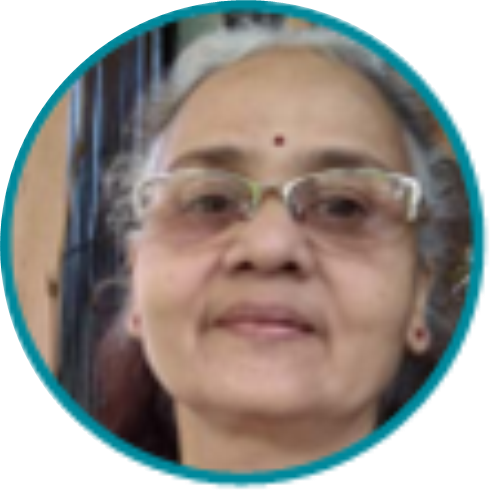
|
Anjali Gokhale has worked with diverse communities and people in Maharashtra and New Delhi. Her ECE work includes documentation of a five-year initiative to strengthen ECE in Dharni, a tribal block in Melghat by Centre for Learning Resources (Pune), process documentation of the rolling out of the ECE curriculum in Maharashtra, along with training of state-evel master trainers in Bengal. She has developed ECE material and programs for UNICEF in different parts of India. She has a also taken part in extensive training, documentation and systematic monitoring. She has developed several booklets and manuals for nutrition and growth monitoring of children for several state governments. |
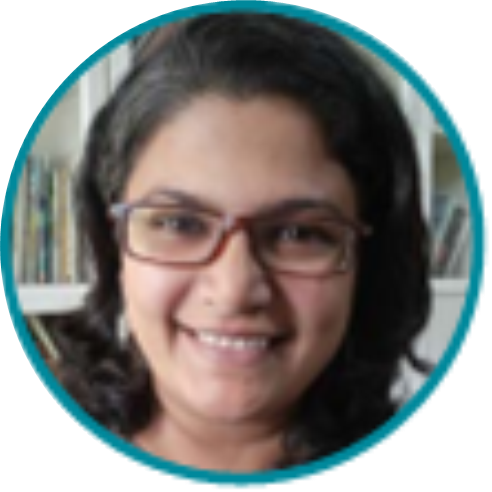
|
Manasee Mahajan has a degree in computer science. Working as a core team member with PSS, she has designed Pustak Maitri Abhyaskram for teachers and library educators. She has designed and developed SL resource material for pre-primary, and classes 1 and 2 for PSS as well. She is also an educator at Khelghar, working directly with young children. She is passionate about books and storytelling. She has worked as a translator for the project “A million books for a billion people” with Arvind Gupta. |

|
Vidya Ghugari has a background of social work, child development and education. She has carried out several impact assessment studies in ECE. She has been involved in the design process of creating modules for capacity building of early childhood educators—in both government and non-government sectors, working especially for underprivileged children. She has experience in capacity building, mentoring and monitoring, especially in tribal areas. She has also prepared theme-based manuals for teachers. She has worked as a member of the curriculum design team for Chhattisgarh’s ECE program as well. |
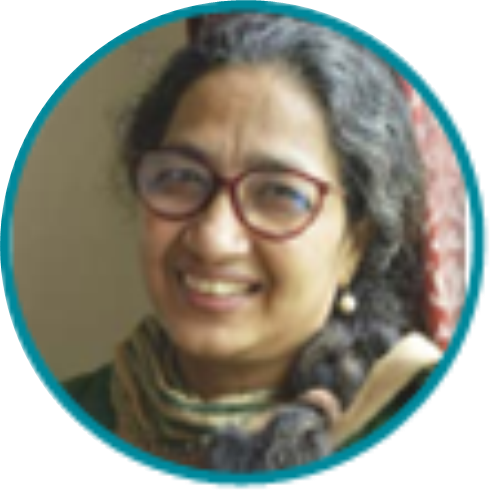
|
Shalaka Deshmukh is an artist who has been associated with children’s education for the past 30 years. She brings the aspect of art and creativity into children’s education as a natural pedagogical tool. She is Assistant Secretary and Head of Centre for Quality Education at Shikshan Mandal, Goregaon, which has been a sister organization of PSS. She has worked with PSS in ECE and language in primary schools. Shalaka has been practising PSS’s pedagogy in her Balwadis since 2015 and has found it rewarding. She also supports PSS in the “Pustak Maitri” course, talking about illustrations and bringing print to life through pictures. |


